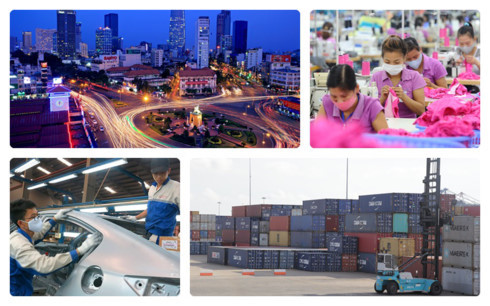 |
Vietnam has emerged as an attractive destination for foreign investors that intend to move their investment out of China due to their worries over high labour costs and escalating tariffs caused by the trade tensions.
The US raised the pressure by lifting tariffs to 25 per cent from 10 per cent on the US$200 billion list of Chinese imports as negotiations on resolving the ongoing US - China trade war stalled last week.
Meanwhile, President Trump stated he could impose 25 per cent tariffs on another US$300 billion worth of Chinese goods.
China in turn has made clear that it will respond to US tariffs in a similar fashion. The Asian country is scheduled to levy retaliatory tariffs on some 5,000 imports from the US on June 1 onwards.
Analysts believe that the trade war is currently at its peak and it could trigger a global crisis. Failure by the US and China to reach any agreement is likely to result in a slowdown in global trade and escalate the risk of a global recession.
Dr. Le Xuan Sang, deputy head of the Vietnam Institute of Economics noted that the ongoing trade war has yielded obvious impacts on the Vietnamese economy. Sang said whether the US or China comes out on top, but the later seems to record strong growth in its trade surplus.
“Sometimes, external disputes such as the trade war could do good for Vietnam, thus we would not voice much concern regarding it,” he believes.
Economist Nguyen Tri Hieu said that the ongoing trade war could lead to a global economic crisis. However, the country, with its macroeconomic stability, could suffer from negative impacts only the first six months or one year since the beginning of such crisis.
He underpinned his stance by the fact that in 2008 the Vietnamese economy remained “safe” amid the global financial crisis and the country only sustained consequences during 2009 and beyond.
According to the International Monetary Fund, the trade war has potentially led to a slowdown in the global economy. However, this may not be bad news for Vietnam and the ASEAN block at large. Compared to the increasing tariffs levied on Chinese goods, products made in Southeast Asia become cheaper and more receptive to US consumers.
Vietnam has always been achieving robust economic growth prior to the beginning of the trade war. Having been backed by labor - based production, the Vietnamese economy gained an impressive growth rate of 7.08 per cent in 2018 – the peak level over the past decade.
Adam McCarty, chief economist from the Mekong Economics consulting firm, asserted that Vietnam has emerged as an attractive destination for foreign investors that intend to move their investment out of China due to their worries over high labour costs and escalating tariffs caused by the trade tensions.
Analyst Nick Marro from the Economist Intelligence Unit viewed Vietnam and Malaysia as the countries enjoying the most benefits from the escalating trade tensions, especially those for the production of intermediate components, cell phones, and laptops.
Technology sector has been suffering the most from the trade disputes as electronic items and components top the list of products subject to the tit-for-tat tariffs.
VOV
 Concerns on external disputes like the ongoing US - China trade tensions should be tempered as they could present Vietnam with good opportunities, analysts have suggested.
Concerns on external disputes like the ongoing US - China trade tensions should be tempered as they could present Vietnam with good opportunities, analysts have suggested.